Domestic violence crisis: More defendants using mental health reasons to avoid conviction
DOMESTIC violence defendants are increasingly using mental health reasons to avoid being convicted on new choking laws. Some victims, like Andrea Khan, have revealed their horrific stories.
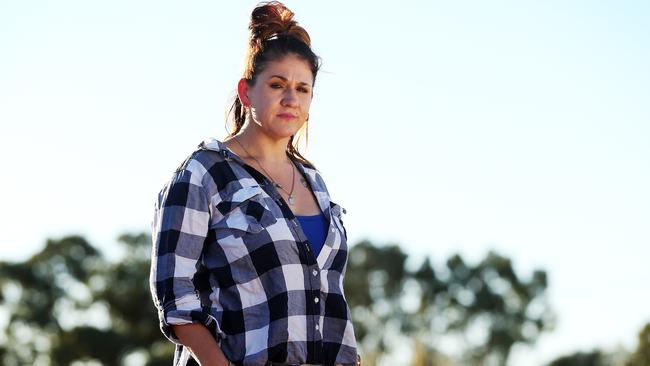
NSW
Don't miss out on the headlines from NSW. Followed categories will be added to My News.
LIKE many victims of domestic violence, Andrea Khan’s abuse started in small doses.
First, her partner took control of her phone, vetting every saved number. Later, she was banned from using Facebook.
Then the assaults began, strategic attacks that culminated with his hands around her neck and squeezing until she lost consciousness.
“He was really smart with the way he attacked me,” Ms Khan said.
“Strangulation doesn’t leave any injuries or bruising.”
Her now former partner Bradley Stewart, a 39-year-old concreter, has become one of 121 people convicted under newly implemented strangulation laws designed to assist domestic abuse victims.

Introduced in 2014, the amendments fixed a shortfall in the previous legislation requiring police officers to prove the choking was committed as part of a more serious offence, such as sexual assault.
In roughly 70 per cent of cases, that became too difficult, meaning the strangulation offence would end up downgraded to a common assault, despite its lethality.
Two years on, police are increasingly using the new choking law with some success, laying 163 charges the year they were introduced and another 260 charges in the year that followed, according to the Bureau of Crime Statistics and Research.
But convictions remain elusive — 234 of the charges have either been deferred or dismissed due to mental health reasons cited by the defendant, while another 68 charges ended in verdicts of not guilty.
In some of the cases, the charges collapsed because the victims withdrew co-operation, a sticking point that is typical of domestic violence charges and especially common in rural NSW communities.
Ms Khan’s matter is a case in point. She attempted to withdraw the charges against her partner the morning after they were filed.
Speaking from her home in Broken Hill, she described meeting him in 2013 and keeping up a long-distance relationship while he worked in Darwin.
A year later he moved back and ramped up his physical assaults, always keeping a charming and loving outer facade during their outings in the community.

The choking escalated when the mother-of-four tried to end the relationship.
“He actually choked me to the point where I’ve passed out,” Ms Khan said about one of the incidents. She described moments during the abuse where she thought her life could be ending.
“There was those moments where I thought I’m not waking up. You can’t fight him off. You can’t beg him to stop. You can’t do anything; you have to just lay there and hope he lets go before it’s too late,” she said.
Further attempts to leave were met with threats to harm her children, so Ms Khan stayed for their sake and chronicled the abuse in a diary, a canny decision that eventually helped seal Stewart’s conviction.
The breakthrough came in 2015 when a former girlfriend of Stewart’s moved to Broken Hill from interstate with an apprehended violence order against him.
When officers turned up on Ms Khan’s doorstep to deliver the AVO, she was quietly taken aside and asked about any similar treatment.
Stewart was arrested the next morning, but Ms Khan almost immediately tried to recant her evidence. She was fearful of how others she expected to cross paths with in the small town would react.
“In this particular case the offender had a lot of family support,” said Paul Albury, the acting commander of Barrier Local Area Command, which covers Broken Hill, a township that recorded 160 domestic violence incidents in the year to December 2016.
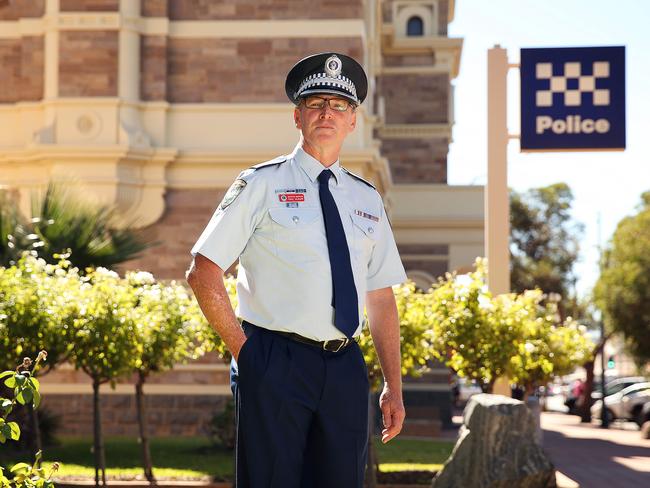
The command recently appointed a second fulltime domestic violence liaison officer to assist with its workload of cases.
“There are only a certain amount of social locations that exist, so how do you escape running into those people … running into family members who talk to you about it and put pressure on you about it,” he said.
Another problem for women based in rural communities is where to go once their police complaint is filed, said Fiona Camelleri, the Broken Hill co-ordinator of Staying Home Leaving Violence, a service that helps women in abusive relationships.
“It’s a lot easier to find accommodation for one person than it is for a woman with four children,” Ms Camelleri said.
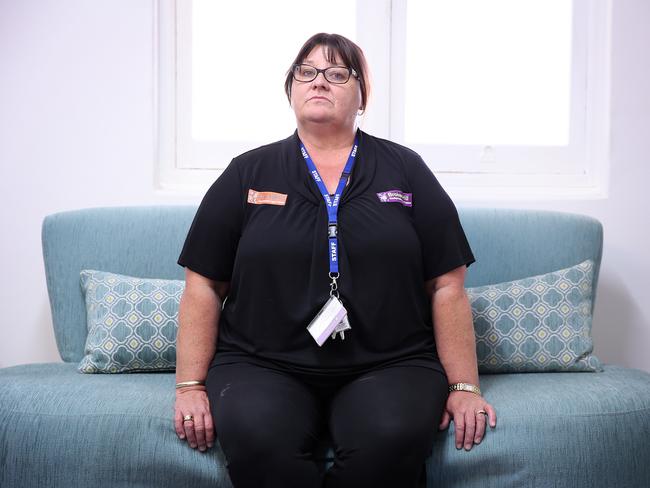
She said regional towns such as Broken Hill needed more emergency accommodation for men, allowing women and children to stay in their homes, and also proposed a men’s behavioural change program to help curb their violent tendencies.
Detectives worked hard to keep Ms Khan from withdrawing her statement, repeatedly sending her news articles that highlighted successful cases, if only to prove the system could be trusted to deliver justice.
The tactic worked, but the court result was bittersweet: Stewart was convicted of four choking charges, but received a minimum sentence of just two years.
With his August parole date approaching, police hold fears for Ms Khan’s safety, and she is considering a possible relocation.
“I want to stand my ground,” she said, “but this could be me messing with my life. It could be me messing with my kids’ lives.”
* 1800RESPECT — 1800 737 732 National Sexual Assault, Domestic and Family Violence Counselling Service
HAMMER ATTACK CAME AFTER FLOWERS
ONE day Trevor Bugmy was buying his long-term partner Eileen Williams flowers and a card for Valentine’s Day.
The next, he allegedly tried to kill her with a claw hammer.
The 48-year-old mother and grandmother, speaking at her Broken Hill home last week, said the attack left her with severe scarring across her scalp, a broken arm and short-term memory loss.
“They told me what happened and I was really surprised. I just asked them why,” she said.
“I had nightmares of being hit with the hammer again when I was in hospital. It was very bad.
It’s lucky I didn’t die.”
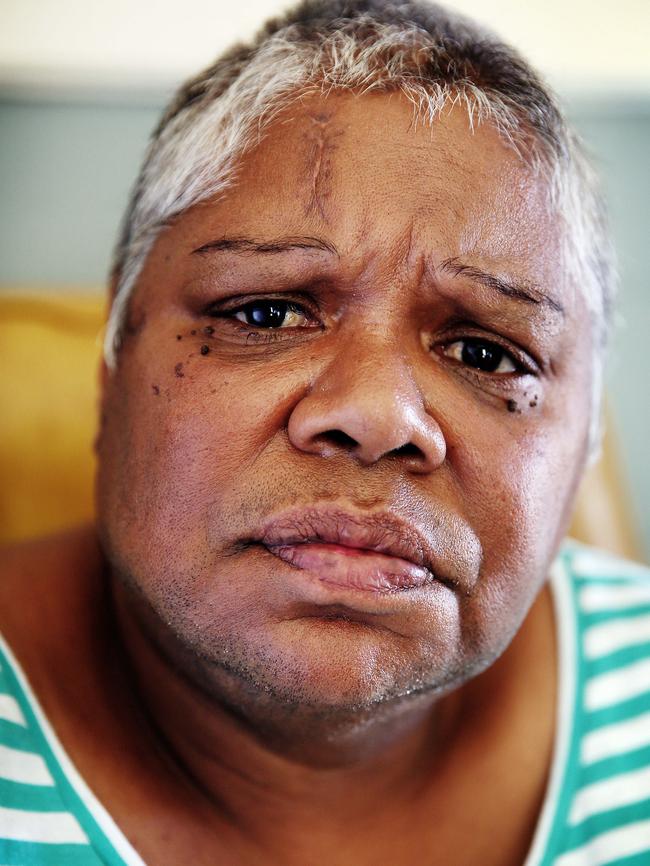

Police will allege 54-year-old Bugmy, who had been in a relationship with Ms Williams for about six years and is the father of her son, brutally beat her with the hammer in an unprovoked attack at a friend’s house in Broken Hill in February.
“He went and bought me flowers and a Valentine’s card,” Ms Williams said.
She said she agreed to “have a drink” with Bugmy the following day before the pair went to a mutual friend’s house.
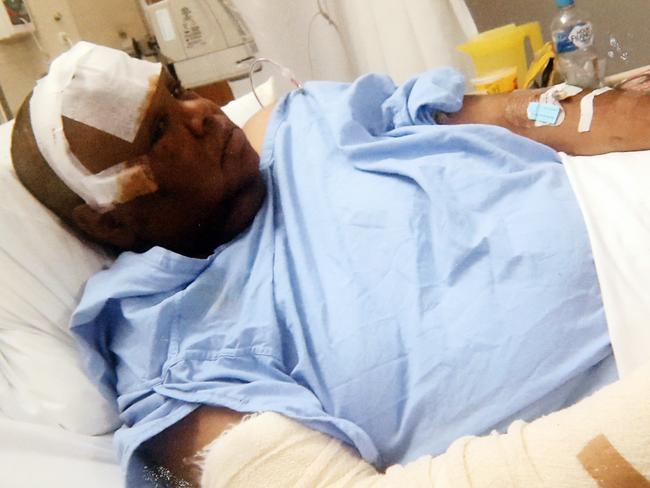
He allegedly attacked her before being interrupted by friend Peter Ardern, who fended off Bugmy before calling police and an ambulance.
Ms Williams was flown to the Royal Adelaide Hospital in a critical condition and had surgery for her injuries.
She is speaking out in the hope of encouraging other women to leave their violent relationships before its too late.
“I would say just don’t be in that relationship. Don’t put up with the abuse,” she said.


